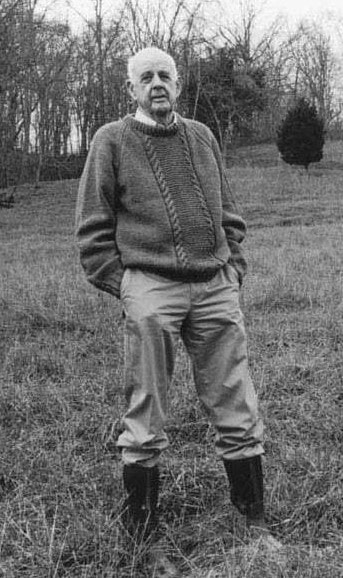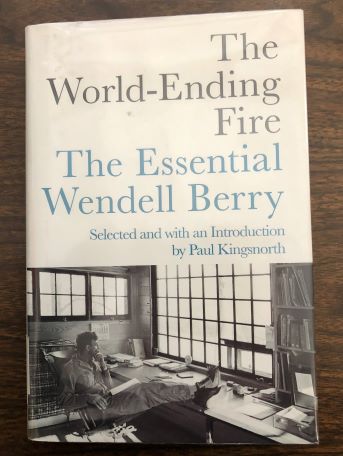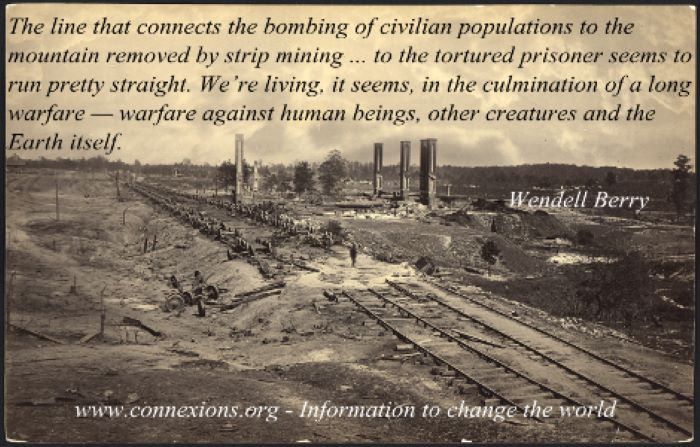|
One of my main regrets from my long association with the Commonwealth of Kentucky is that I have never met Wendell Berry. He was already a name in the papers – the poet who wrote with a pen or pencil, the agrarian who warned against forgetting the old ways of farming. He is still at it, age 87, somehow surviving without a computer or television, on his land in Port Royal, and still publishing whenever he feels like it. Finally, finally, with fires raging and tornados rampaging and strip-mine detritus floating past his farm on the Kentucky River, I picked up one of Berry’s most recent books, “The World-Ending Fire: The Essential Wendell Berry,” Selected and with an Introduction by Paul Kingsnorth, published by Counterpoint Press in 2017. Well, never too late – at least to read and honor Wendell Berry, if not to act on his warnings. Those issues were already out there from 1970-72, when my family moved to Kentucky for the Times, for me to cover Appalachia, and, as my wife puts it, “George lived in Harlan and I lived in Louisville.” Certainly, I covered what Wendell Berry preached – the damage from gouging coal from the fragile surface of the Cumberland Mountains; the need to farm intelligently and personally, not by corporation; the sellout by politicians who scorned the land for their own profit. (See: Manchin, Joe, a/k/a Blind Trust Joe, Commodore Manchin, and Worse.) But why didn’t I try to flash my NYT credentials and try to arrange an interview with Wendell Berry and his wife-partner-fellow-agrarian Tanya Berry? Goodness knows, I got around Kentucky. I met Harry Caudill, whose book “Night Comes to the Cumberland” made me want to go to Appalachia, to write about it. I got an epic private tour of Gethsemani Abbey outside Bardstown, and met the monk-colleagues of Thomas Merton, a few years after he died in 1968. I visited Pauline Tabor, the famed madam of Bowling Green, Ky., at her tasteful home with her majolica collection. I went campaigning with Happy Chandler on his nostalgia-trip final campaign. I got to know the McLain Family Band out of Berea. I also met Jean Ritchie, originally from Viper, Ky., the personification of Kentucky folk music, who also lived in our home town on Long Island. In Louisville, we lived next door to Rabbi Martin Perley, brave civil rights advocate, and his wife, Maie Perley, a writer. And I depended on the superb journalism of the weekly paper, The Mountain Eagle ("It Screams!") in Whitesburg, bravely issued by Tom and Pat Gish. And I interviewed Sen. John Sherman Cooper when he announced his retirement (in an era when Kentucky Republican senators were not necressarily vile.) Oh, yes, and I interviewed Loretta Webb Lynn of Butcher Holler, Ky., on the morning after she won country music’s Entertainer of the Year in 1971, and we stayed in touch. So you tell me: why didn’t I try to meet Wendell Berry?  His words and messages are very much out there. My Appalachian “correspondent,” Randolph Fiery, originally from West Virginia, often cites Berry as a spiritual and ecological inspiration, so I took out the book from the great Nassau County library system. Berry had me in the first pages of the first selection, “A Native Hill,” written in 1968 – in which he describes his odyssey in his 20s from academic and writer in the great cities to return to the land, owned by his family for six or seven generations. He follows the trickle of water toward the larger streams below: “As the hollow deepens into the hill, before it has yet entered the woods the grassy crease becomes a raw gully, and along the steepening slopes on either side. I can see the old scars of erosion, places where the earth is gone, clear to the rock. My people’s errors have become the features of my country.” Berry’s words touch off memories of the first house we bought, out east of Louisville, in an old place called Prospect. Builders had carved a freaking golf course into the plateau and our new house sat on the western edge, facing undulating plains – including a family cemetery. (The realtor promised us there would be no further development.) A trail led downhill, following the trickles, toward Harrod’s Creek. I loved walking alone in the woods – well, until a few months later a chunk of rock landed on our back lawn, nearly missing our youngest child -- from dynamite by a crew expanding the sub-division. Turned out the real-estate agent had lied, so we moved much closer to town, but my love of the woods remained. Now I recognize the very same flow of land in Berry’s descriptions of his family farm – from utilitarian Indian paths to dirt roads widened by soldiers and now, not far from his home, “its modern descendant known as I-71, and I have no wish to disturb the question of whether or not this road was needed.” I think of how many times I – or my family of five – barreled back and forth along I-71 toward home (New York) or the nearest city with baseball and other urban pleasures, that is, Cincinnati. Turns out, Wendell Berry’s farm – where he still farms and writes – is an hour to the East End of Louisville. But I never tried to interview Berry about ecology or strip mining or the diminution of family farms.  Berry’s beliefs resonate in his articles over the decade. In the chapter “Family Work,” Berry laments the long hours modern children spend cooped up in school: (“why should anyone be surprised if, under these circumstances, children should become ‘disruptive’ or even ‘ineducable’”) And in “Economy and Pleasure,” he describes the joy of taking his 5-year-old grand-daughter out to work the two-horse team in plowing some family land, and how she took to the reins. (I will not divulge her charming comment at the end of this utilitarian joy ride; she addresses her grandfather as “Wendell.” Cool.) For me, the last chapter was the best – “The Rise,” from 1969, as Berry describes a six-mile canoe sojourn down the Kentucky River – in mid-December – when the water was high, bringing him closer to modern life on the shores. The chapter reminds me of times I went out on Harrod’s Creek.with my friend, Dr. Sid Winchell. In "The Rise," Berry takes the reader to the time of the Shawnee and the arrival of Gen. George Rogers Clark to the still peaceful flow of the Kentucky River, even with all the debris floating alongside the canoe. Berry’s long life of farming and writing and loving the land awaken my sensibilities. I already mourn the new “settlers” in our wooded corner of the suburbs, who cannot wait to hack down trees, despite the first aid trees furnish a grievously wounded planet. Wendell Berry has been preaching to us for more than half a century. Long may he write. By pen or pencil, of course. *** (Mea culpa: written on a ThinkPad, using a Word program, issued by the Weebly site, via the Internet.) *** https://berrycenter.org/ Nice article by Silas House in 2020: https://gardenandgun.com/feature/wendell-berry-the-poet-of-place/
bruce
1/14/2022 04:06:55 pm
george,
George
1/14/2022 09:53:46 pm
Commodore Manchin's daughter was the humanitarian of the family, selling EpiPens at a markup of almost 500 percent. A regular Florence Nightingale. The Commodore knew nothing, nothing .
Altenir Silva
1/14/2022 06:25:19 pm
George: Thanks for introducing me to Wendell Berry. I knew nothing about him. I browsed on Barry Center website. I got very impressed by his way of life. Anyway, you amaze me; you are a New Yorker, but you have the kindest look from the farm life.
George
1/14/2022 09:56:49 pm
Altenir, thanks, you've seen me in my native habitat, emerging from the subway, walking with you and Celia and Neo to the late, lamented baseball pub, Foley's. across the street from the Empire State Building. But I spent time in upstate New York as a kid, and took to the hill country of Appalachia, and its people. ("We're as nice as we are mean," a motel guard with a pistol in his belt once told me.)
George
1/14/2022 09:58:03 pm
Altenir: that was on a hilltop motel above Harlan, so I am sure he was right.
Altenir Silva
1/15/2022 06:22:30 am
“We’re as nice as we are mean.” Wow! It sounds like a great movie line. The motel guard saying this with a pistol in his belt reminds me of the hardness of Clint Eastwood in Italian movies, basically directed by Sergio Leone. I loved it.
George
1/15/2022 09:30:54 am
Dear Altenir: You as a film-maker would enjoy a great documentary, Harlan County, USA, from 1976, by Barbara Kopple, about a nasty strike standoff. (Maybe you know that Harlan is known as "Bloody Harlan": because of history of violence. ) I covered that 1976 demonstration...and was in the town square during a tense standoff. I like to think I am seen for a milli-second in a scan of the crowd I am the only unarmed person in the square. I was definitely there. Worth watching Kopple's masterpiece. GV
Randolph
1/14/2022 07:14:34 pm
George,
George
1/14/2022 10:03:46 pm
Ed Martin
1/15/2022 01:18:16 pm
Reading Muhlenberg County, coincidentally, read this week about General Peter Muhlenberg, Revolutionary War, who accoriding to legend, “threw of his clerk as Minister of Lutheran Church in Woodstock, Va, dispacing his Revolutionary War uniform, and led his parishioners off to fight the Battle of Winchester. The County was named for him.
Randolph
1/15/2022 04:48:44 am
George,
George
1/15/2022 09:35:15 am
Randy, thanks., There are three distinct areas of Kentucky -- Eastern, Central and Western....with coal in the east and west, Plus, Louisville. Happy Chandler used to campaign that if he was elected, he would re-route the Ohio River and cede that sinful city of Louisville to Indiana. I asked him about that, and he laughed. Campaign promises....
Jean Grenning
1/15/2022 07:18:04 am
Thank you for pieces on Kentucky. Last month I read your suggestion about “The Kidnapping of Daniel Boone’s Daughter.” Fascinating.
George
1/15/2022 09:37:22 am
Dear Jean: Thanks, yes, books help keep us sane, don't they? I'm sure these recollections of Appalachia remind you of your WVA days. You've been there. See you soon....we hope. G 1/15/2022 03:45:43 pm
There is not enough said about the resiliency and work ethic of much of rural America. Unfortunately, they are under appreciated by much of urban America.
Altenir Silva
1/16/2022 05:12:49 am
Dear George: I saw the documentary “Harlan County, USA” by Barbara Kopple on YouTube. I really liked the movie. What a strange world! Those men working underground, getting black lung, facing the danger of roof collapse, and when they come back to the surface, they need to fight against the strength of Duke Power Company to get a labor contract decent. The miner’s wives are brave and strong. The songs sung are pure poetry and help to develop the plot. What a great movie! Thank you very much for this recommendation.
George
1/18/2022 08:34:00 pm
Altenir: Thank you so much for that link. I just looked at the first two minutes -- so graphic, I had forgotten. Looking forward to watching.
morris weiss
1/16/2022 07:42:27 pm
consider writing a book about your Ky. experience looking back at 50+years
George
1/17/2022 08:40:41 am
Reply to Morrie: Thanks for the prognosis, sir. I think I've gotten most of my stories out multiple times. (Marianne: "Yes, I've heard that before.") But the framework could be an itinerant worker unsure of his bearings. Like the times I flew back from an assignment (usually I drove), and woke up from a traveler's sleep in an airplane that had just touched down at SDF late in the evening, and when I looked outside at the darkness I would say to myself, "Where the heck am I?" Metaphysical comment, to be sure. So that's the title of the book that aint going to get written. Thanks, best to you both. G&M
George Vecsey
1/17/2022 08:45:55 am
Ed: thanks for your comment about numerous Muhlenbergs. I have only recenty realized just how big the slave trade was above the Mason-Dixon Line. But we didn't hear about it growing up in New York or CT, etc. But there were also heroes -- recently saw a book about the Amsterdam, NY, area, where many burghers of the region sheltered runaway slaves on the Underground, heading to O Canada, the True North Strong and Free. GV 1/17/2022 10:37:22 am
Several recent books have exposed the role of the New England states in promoting and profiting from slavery. These are just two examples.
George
1/17/2022 07:29:41 pm
Great stuff, Alan. GV
Ed Martin
1/18/2022 01:00:09 pm
Thanks GV, Alan, et.al. Ron Chernow’s book, “Hamilton,” which I heartedly recommend, even if you have seen the musical, reports on NY power leadership, not wanting to interrupt the business with slaveholders, Hamilton, was a maverick, bucking the Governor and Hamilton’s inlaws. He represented NY at the Constitutional Convention to replace the Articles of Confederation, although the State did not accept his views on several articles to strengthen the new nation, e.g. federal taxes to pay the debts owed the Revolutionary soldiers, slavery, etc. 1/18/2022 02:32:00 pm
We used to live at 92nd Street and Central Park West, only a few blocks away from the New York Historical Society. I signed up for a six part lecture series on Hamilton. The first five were deadly presentations by academics reading with there noses down in their notes. I would have skipped the sixth one, but the speaker was Ron Chernocw.
bruce
1/18/2022 10:04:42 pm
ed.
George
1/18/2022 08:40:59 pm
Thank you all for your book suggestions. Ed, I loved Chernow's book, read it before the play came out....Alan, I've read part of the Morton book -- the Rothschilds figure in Marianne's genealogy study of some ancestors, who were in business around Manchester when Nathan R began to stimulate the economy there. "The Jazz Baroness?" Who knew.
Ed Martin
1/18/2022 11:11:10 pm
Peggy and I saw “Bird” together around ‘52; I had first heard him in 47-48 era. I played the saxophone, poorly, but somhow “heard” and loved jazz, discovered it on my own. I had heard recordings of other pre-Bird sax players, Coleman Hawkins, Benny Carter, and when I heard Bird the first time, I thought, “What is this?” He played like none before him, strange as it was, I had to go back, and suddenlh
Ed
1/18/2022 11:14:17 pm
Accidentally hid send. End of story is that every jazz saxophone player since has been influenced by him. We knew of Nica, Baroness, but did not realize she was a Rothschild. Comments are closed.
|
Categories
All
|










